|
|
|
Sort Order |
|
|
|
Items / Page
|
|
|
|
|
|
|
| Srl | Item |
| 1 |
ID:
108970


|
|
|
|
|
| Publication |
2011.
|
| Summary/Abstract |
Ancient Chinese Thought, Modern Chinese Power is the latest publication to come from Yan Xuetong's ongoing research project that explores the interstate political philosophy of China's pre-Qin era.1 This book is interesting on many levels, and has already drawn attention from public intellectuals and scholars in the West.2 This essay thus first will examine the scholarly issue of how Yan and his colleagues are employing pre-Qin thought to make philosophical and political arguments about how China will rise. It will consider the relation of the 'kingly way' (wang ?) and the 'hegemonic way' (ba ?) to critically analyze Yan's argument that China should create a new kind of world leadership by pursuing political power, rather than economic and/or military power. While the book translates wang loosely as 'humane authority', we will argue that the literal translation 'kingly way' better reflects Yan's arguments for a new world order that is determined by the moral leadership of China's political elite. Building on this detailed textual analysis, the essay then will locate the book's arguments in wider academic debates about international relations theory, the role of the public intellectual in China, and the politics of translation. Lastly, the essay argues that the book is geared towards two audiences beyond the academy, to advise China's political leaders and reassure the West. The goal is to see how Ancient Chinese Thought, Modern Chinese Power revives-and reinterprets-traditional ideals to chart China's future as the world's future.
|
|
|
|
|
|
|
|
|
|
|
|
|
|
|
|
| 2 |
ID:
051446


|
|
|
| 3 |
ID:
120461
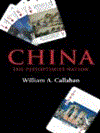

|
|
|
|
|
| Publication |
Oxford, Oxford University Press, 2012.
|
| Description |
xvi, 266p.Pbk
|
| Standard Number |
9780199604395
|
|
|
|
|
|
|
|
|
|
|
|
Copies: C:1/I:0,R:0,Q:0
Circulation
| Accession# | Call# | Current Location | Status | Policy | Location |
| 057325 | 327.51/CAL 057325 | Main | On Shelf | General | |
|
|
|
|
| 4 |
ID:
120462
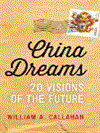

|
|
|
|
|
| Publication |
Oxford, Oxford University Press, 2013.
|
| Description |
212p.Hbk
|
| Standard Number |
9780199896400
|
|
|
|
|
|
|
|
|
|
|
|
Copies: C:1/I:0,R:0,Q:0
Circulation
| Accession# | Call# | Current Location | Status | Policy | Location |
| 057326 | 327.51073/CAL 057326 | Main | On Shelf | General | |
|
|
|
|
| 5 |
ID:
113698
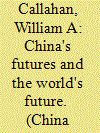

|
|
|
|
|
| Publication |
2012.
|
| Summary/Abstract |
China's growing economic, political, and cultural power is an important global issue; Chinese people are increasingly interested in thinking about their country's future as a world power. This article introduces the special issue 'China's futures - and the world's future' by discussing how futurology works in China. It argues that Chinese futures studies exhibit two general trends: (1) a shift from locating the future outside China to see China itself as the future, and (2) a shift from officials centrally planning the future to many different people dreaming about many different futures. The battle for the future thus is not necessarily between China and the West, but also takes place within the People's Republic of China amongst different groups of Chinese intellectuals. This Introduction examines themes that unite the special issue's diverse set of articles, especially the interplay between technical and cultural innovation. Studying the future here is important not because the forecasts are 'true'; more importantly, Chinese discussions of the future can tell us about how people in the PRC interact with their own past-present-future, and how they interact with people in other countries in the present.
|
|
|
|
|
|
|
|
|
|
|
|
|
|
|
|
| 6 |
ID:
114646
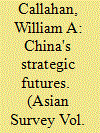

|
|
|
|
|
| Publication |
2012.
|
| Summary/Abstract |
This essay examines how China's "harmonious world" foreign policy has unintentionally created opportunities for citizens to challenge elite discussions of foreign policy. Although they are relative outsiders, the essay argues that citizen intellectuals are a growing influence as a source of ideas about China's future-and the world's.
|
|
|
|
|
|
|
|
|
|
|
|
|
|
|
|
| 7 |
ID:
085581


|
|
|
|
|
| Publication |
2008.
|
| Summary/Abstract |
Lately, there has been increasing interest among international relations (IR) scholars in Chinese thought, both as an alternative to Eurocentric IR, and because the PRC as an emerging power will soon have the institutional power to promote its view of the world. Rather than look for suitable Chinese parallels to "international,""security," or other mainstream concepts, this article will examine the concept of "Tianxia All-under-Heaven" to understand Chinese visions of world order
|
|
|
|
|
|
|
|
|
|
|
|
|
|
|
|
| 8 |
ID:
157070


|
|
|
|
|
| Summary/Abstract |
Although gardens are typically appreciated as peaceful spaces of apolitical serenity, this article highlights how gardens can provide new sites and sensibilities that complicate our understanding of diplomacy, war, and peace. While gardens are a popular location for diplomatic performances—for example, the Treaty of Versailles—the global politics of gardens remains underresearched in international relations (IR). To address this gap, the article follows the “aesthetic turn” in IR to examine gardens as contingent social constructions of social-ordering and world-ordering, which both shape and participate in global politics. In particular, it develops a framework to examine how peace-war becomes intelligible in gardens through contingent conceptual dynamics such as “civility/martiality.” It then employs the framework to explore how two key national memorial sites—the Nanjing Massacre Memorial in China and the Yasukuni Shrine in Japan—work as gardens to creatively perform civility and martiality in unexpected ways. Such an oblique intervention underlines how war memorials, gardens, and other odd IR sites are not stable containers of meaning but need to be actively (re)interpreted as performances of cultural governance and resistance. Garden-building here is theory-building: by producing new sites and sensibilities of global politics, it creatively shapes our understanding of IR.
|
|
|
|
|
|
|
|
|
|
|
|
|
|
|
|
| 9 |
ID:
071736
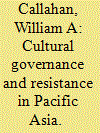

|
|
|
|
|
| Publication |
London, Routledge, 2006.
|
| Description |
x, 245p.
|
| Standard Number |
0415368995
|
|
|
|
|
|
|
|
|
|
|
|
Copies: C:1/I:0,R:0,Q:0
Circulation
| Accession# | Call# | Current Location | Status | Policy | Location |
| 051223 | 306.2095/CAL 051223 | Main | On Shelf | General | |
|
|
|
|
| 10 |
ID:
061264


|
|
|
| 11 |
ID:
065380


|
|
|
| 12 |
ID:
072687


|
|
|
|
|
| Publication |
2006.
|
| Summary/Abstract |
Chinese nationalism has ignited much debate among academics and the general public in both China and the West. Rather than search for the true core of Chinese nationalism, this essay will examine the curious custom of National Humiliation Day as an oblique entry into the politics of identity. The nation is not simply a question of people or territory, the author contends, but of time: the national time scripted by events such as National Humiliation Day. By comparing the differing practices of the holiday as it was celebrated in the early twentieth century and is observed in the early twenty-first century, the author argues that in the early twentieth century the political performances aimed to produce a proper Chinese nation out of the clashes between the Qing dynasty, northern warlords, and foreign empires. The goal was to construct a "China" worthy of being saved. When National Humiliation Day was revived in China at the turn of the twenty-first century, the political performances were more focused on containing the nation through a commemoration of the various crises of the early twentieth century. Thus the essay will argue that the nation does not arise from the ideology of its leaders, as much as through popular performances such as National Humiliation Day. Hence it shows how politics is best analyzed as a series of performances, not just by state actors in official sites like the Foreign Ministry, but also through the cultural governance of less official sites in art, film, literature - and public holidays. In this way, National Humiliation Day activities go beyond producing and containing nationalism; Chinese people are also consuming nationalism as part of a symbolic economy that generates identity.
|
|
|
|
|
|
|
|
|
|
|
|
|
|
|
|
| 13 |
ID:
141450
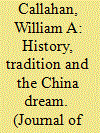

|
|
|
|
|
| Summary/Abstract |
How will China influence world politics in the twenty-first century? Many people answer this question by looking to Chinese history, and particularly to traditional models of Chinese world order. This essay seeks to complicate this question by asking which history, and which tradition? While it is common to look at China's pre-modern history as ‘tradition’, this essay argues that we also need to appreciate how ‘socialism’ is treated as a tradition alongside Chinese civilization. It does this by examining how China's public intellectuals appeal to two seemingly odd sources: Mao Zedong's 1956 speech ‘Strengthen Party Unity and Carry Forward Party Traditions’, and the ‘Great Harmony’ passage from the two millennia-old Book of Rites. It will argue that these two passages are employed as a way of salvaging socialism; the ideological transition thus is not from communism to nationalism, but to a curious combination of socialism and Chinese civilization. This new socialist/civilization dynamic integrates equality and hierarchy into a new form of statism, which is involved in a global competition of social models. Or to put it another way, what these two passages have in common is not necessarily a positive ideal, but a common enemy: liberalism, the West and the United States.
|
|
|
|
|
|
|
|
|
|
|
|
|
|
|
|
| 14 |
ID:
066915


|
|
|
| 15 |
ID:
052672


|
|
|
|
|
| Publication |
Mar-May 2004.
|
|
|
|
|
|
|
|
|
|
|
|
|
|
|
|
| 16 |
ID:
061506
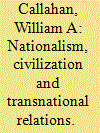

|
|
|
| 17 |
ID:
160120


|
|
|
|
|
| Summary/Abstract |
As Donald Trump’s presidential campaign showed, walls are a hot topic. While ‘globalisation’, with its free flow of capital and goods, characterised world politics after the end of the Cold War, the twenty-first century has witnessed a reassertion of cultural, legal, and physical barriers. It is common to criticise such post-Cold War walls, especially the US-Mexico Barrier and Israel’s West Bank Barrier, as ineffective and immoral. This article problematises such critical discourse by using unlikely juxtapositions (the Great Wall of China) and new conceptual frameworks (gaps, critical aesthetics) to explore: (1) how walls can be a rational security policy; (2) how they are not simply barriers, but can be complex sites of flows; and (3) how walls are not simply texts waiting to be decoded: they are also sites of non-narrative affective experience that can even excite the sublime. This critical juxtaposition of walls first explores what they can tell us about the politics of borders, identity, and foreign policy, and then considers how walls, as concrete visual artefacts, can be examples not simply of ideology, but also of affect. The article aims to understand walls in a different register as active embodiments of political debate – and of political resistance.
|
|
|
|
|
|
|
|
|
|
|
|
|
|
|
|
| 18 |
ID:
113705
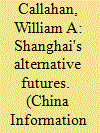

|
|
|
|
|
| Publication |
2012.
|
| Summary/Abstract |
Civil society seems to be a dead issue in China because its formal aspects of mobilization and institutionalization are so tightly regulated by the party-state. This article looks to activities in and around the Shanghai World Expo (2010) to rethink the meaning of civil society and political action in China. Through an analysis of the Expo's national, theme, and corporate pavilions, it shows how Beijing is planning a harmonious future for China and the world. Yet alongside this unified future, it examines how Shanghai's citizen intellectuals - filmmaker Jia Zhangke, artist Cai Guoqiang, and blogger Han Han - are creating alternative futures. This multiple decentralized view of the future is an integral part of building alternative notions of civil society in China. The article thus has two goals: (1) to contrast official constructions of a unified harmonious future with citizen intellectuals' multilayered views of Shanghai's past-present-future; and (2) to explore how citizen intellectuals are creating a new civil society that can build alternative futures.
|
|
|
|
|
|
|
|
|
|
|
|
|
|
|
|
| 19 |
ID:
067389


|
|
|
| 20 |
ID:
189019
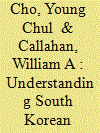

|
|
|
|
|
| Summary/Abstract |
This study aims to examine South Korean middle power diplomacy discourses using premodern Korea’s diplomatic thinking-cum-practice of sadae (serving the great) as a heuristic device. It is argued that current discourses of South Korea as a middle power resonate with sadae because they strive to secure the existing liberal international order led by the West and the United States. It also argues that it is both necessary and healthy for South Korean middle power diplomacy studies to denaturalize its self-evident faith in the existing liberal international order—a not universal but particular order among several possible others in history—with South Korea celebrating and appropriating liberal values. This would prepare South Korean middle power diplomacy research to tackle uncertainty, difference, and pluralism in global politics while producing more responsible and responsive scholarship in international relations.
|
|
|
|
|
|
|
|
|
|
|
|
|
|
|
|
|
|
|
|
|